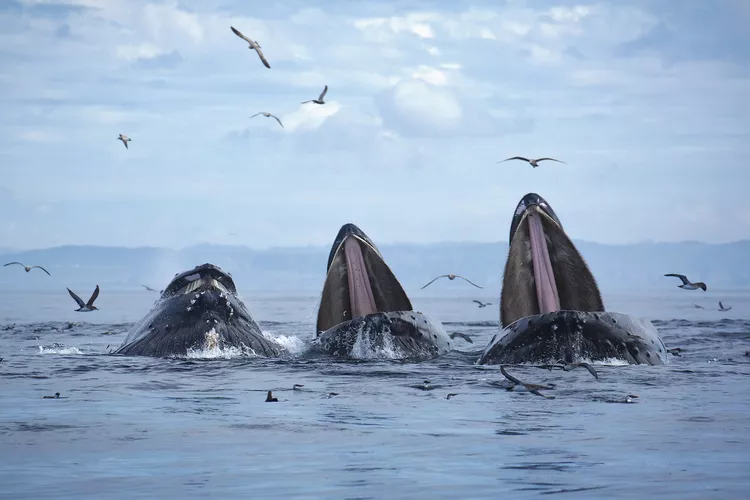Summary
The Monterey coast is one of the best places in California — or perhaps in the world — to watch whales and other marine life.
Whales come to the Monterey Bay because it’s full of things they like to eat. Plankton, krill, squid, and anchovies are all carried to the ocean’s surface by a perfect combination of wind, the angle of the coastline, and the earth’s rotation.
In fact, the Monterey Bay National Marine Sanctuary is almost like Africa’s Serengeti plains, rich in wildlife. More than 30 species of marine mammals, 180 species of seabirds and shorebirds, and at least 525 species of fish live in it.
:max_bytes(150000):strip_icc():format(webp)/whale-watching-in-monterey-and-santa-cruz-1478448_FINAL-8a835da7c64e4f5181bc49a00dbbb5e7.png)
Best Time for Whale Watching in Monterey Bay
To make the Monterey and Santa Cruz area even more appealing, the whale-watching season is the longest in the state of California, lasting more or less all year. No matter when you go, you’re likely to see one or more whale species, which may be migrating through the area or feeding in the bay.
Humpback whales and blue whales can be found year-round in the Monterey Bay. It’s not unusual to see a rare fin or minke whale there, too. Moreover, once in a while, even rarer beaked whales and sperm whales also show up.
National Geographic-worthy moments happen when migrating gray whales pass through the Monterey Bay from mid-December to April. As the gray whales cross the underwater canyon, killer whales (orcas) wait for them—and attack, most often in April and May. This thrilling encounter has been captured in a video from National Geographic involving a mother gray whale, her calf, and a pack of killer whales. If you might find that disturbing, consider asking whether orcas have been sighted before you go on a whale-watching cruise.
From May through mid-December, humpback whales and blue whales feed on anchovies and krill in the Monterey Bay, often spending several days in the same spot. Consequently, this makes them easier to find, and they also spend a lot of time near the surface, giving you a close look at them.
Besides the whales, people often see Pacific white-sided dolphins, Risso’s dolphins, and Dall’s porpoises in the bay. Local tour operators indicate that it’s not unusual to see a thousand or more dolphins at a time.
Whale Watching Cruises in Monterey Bay
The Monterey Bay makes a broad, sweeping arc along the Pacific coast. The town of Monterey is on the south end, Santa Cruz on the north, and Moss Landing in the middle. You can go whale watching anywhere along its shores.
From the town of Monterey, Monterey Whale Watching is the most reviewed and highest-rated Monterey whale-watching cruise by users at Yelp. Reading some of their reviews can provide a better idea of what the experience is like.
From Moss Landing, well-rated Sanctuary Cruises always sails with an expert marine biologist on board. Moss Landing is at the end of the submarine Monterey Canyon, which allows their boats to reach deep water (where the whales are) very quickly.
From Santa Cruz, try Santa Cruz Whale Watching, which consistently receives top marks from Yelp reviewers, who rave about their knowledgeable and experienced crew.
Whale Watching from the Shore Around Monterey Bay
You can watch whales from the land along the Monterey coast, but the best places for that aren’t on the shores of the bay. Instead, they are south of Carmel along the coast.
Consider visiting Point Lobos State Reserve where they pass close to Pinnacle Point, which you can reach by taking the Cypress Grove Trail.
You may also see humpback whales offshore near California Highway 1 between Nepenthe Restaurant and the town of Big Sur. People also report seeing whales from the bench at the end of Overlook Trail in Julia Pfeiffer Burns State Park.
How to Enjoy Monterey Whale Watching
No matter where you watch the whales, the basics are the same. It’s essential to follow tips for picking the best cruise and ensuring the most enjoyable experience while observing these magnificent creatures.




